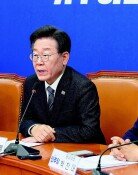[Editorial] Interests, Not Protests
With the second round of negotiations for a Korea-U.S. Free Trade Agreement starting today in Seoul as a five-day event, general strikes and large scale protests against the U.S. are expected to take place. One civic group, the so-called Korea Alliance against a Korea-U.S. FTA, announced that it will mobilize its entire national force against globalization, such as left wing civic groups, farmers, and labor workers, in order to prevent any development of the negotiations.
Ahead of the important negotiation that is involved in critical interests between two countries, it should be a proper action to study on strategies about how to gain more benefit from this. However, given such circumstances, it is hardly predictable to see a successful outcome.
In order to obtain more benefit, accurate examinations on each sector and generation of subsequent strategies are very important. In fact, the U.S. Trade Representative (USTR) has gathered information from such industries as intellectual property, pharmacy, agriculture, medical equipment, paper manufacture, and rubber industry, among others, for this negotiation. However, two public hearings that Korean government planed for preparation of this negotiation were canceled because of interruption of recalcitrant groups.
The Korea labor unions also plan to seek collective actions with AFL-CIO, the U.S. federation of labor organizations, which visited Seoul to show its anxiety over possible decrease of job opportunities after the Korea-U.S. FTA is signed. It is not understandable why Korean labor unions seek such an alliance. In addition to this, the Korean Confederation of Trade Unions (KCTU) plans to go on general strike from July 12, and the Jukbong Group, which played a leading role in protests against the expansion of a U.S. base to Pyeongtaek, also joined this move.
Like this, the anti-U.S. left wing groups have begun to mobilize their powers with the FTA talks taking place in Seoul. In regard to this, the government that has turned a blind eye to the spread of left wing forces and increasing violence occurring during rallies should assume a great degree of responsibility.
The Korean government has not showed any persuasion to get people who are anxious about market opening to believe that opening is a right way to go. In fact, given our economic structure that highly turns to exports, making inroads into the U.S. market through the FTA is a necessary strategy for sustainable economic development in Korea. We have no time to hesitate because of obsolete ideology. Through this negotiation, we will check if the government has an intention to push ahead of the FTA.
If, because of violent demonstrations and illegal strikes, the negotiation ends up foundering, the Korea will be seen as a country fighting against globalization to other countries. In recent, Koreas national credibility is seriously damaged by security incidents. If the Korea-U.S. FTA ends up with nothing, Koreas position as a business partner is no longer attractive to other countries.







